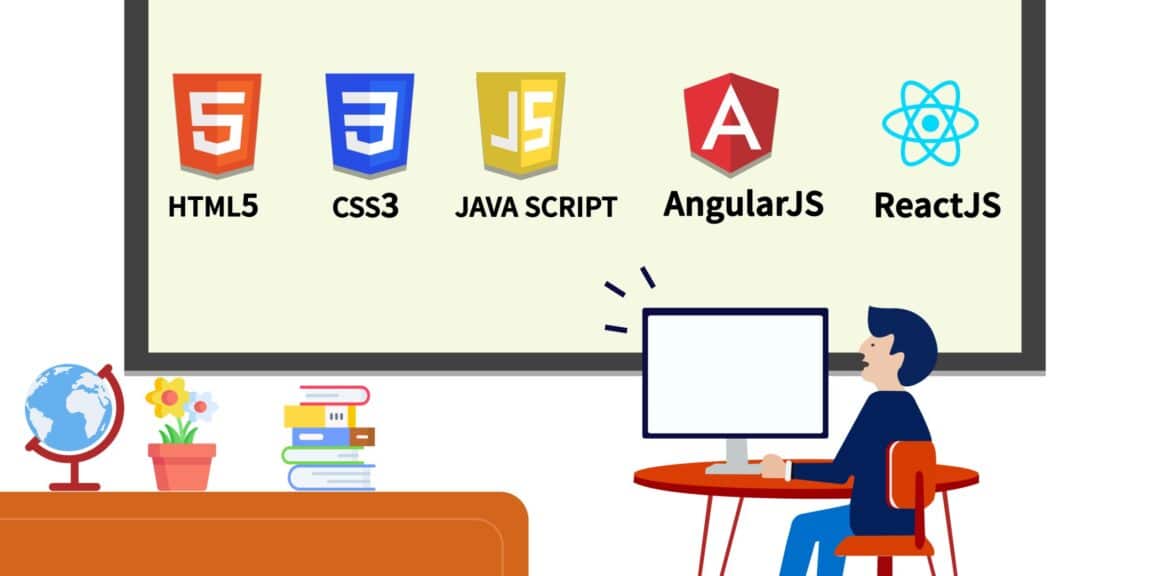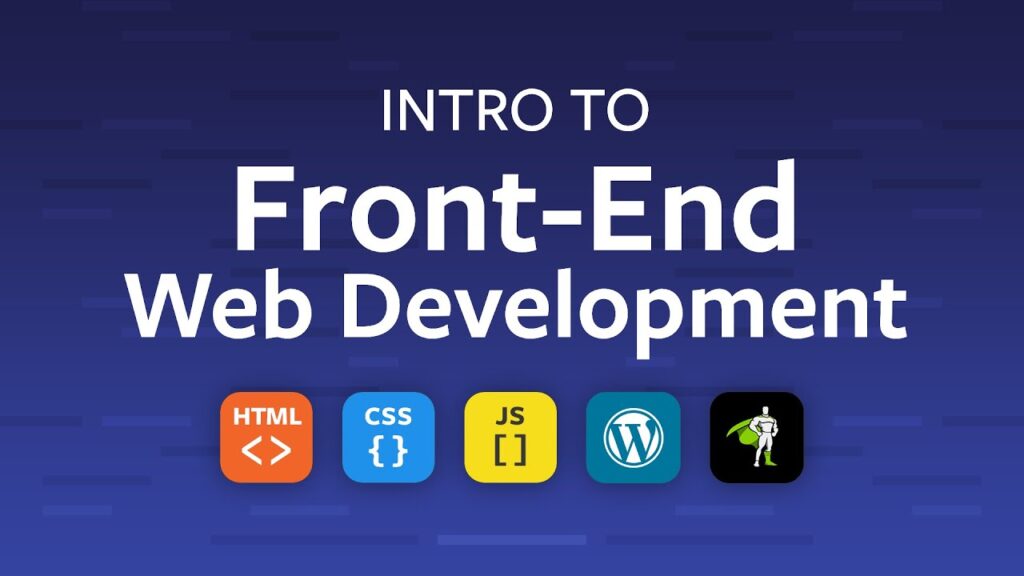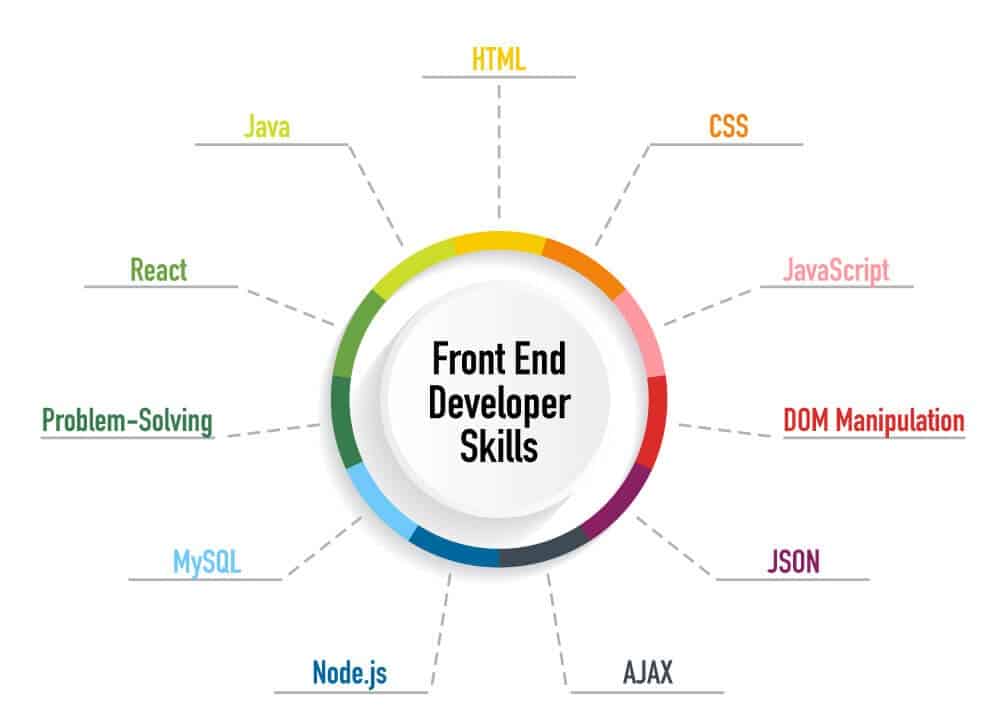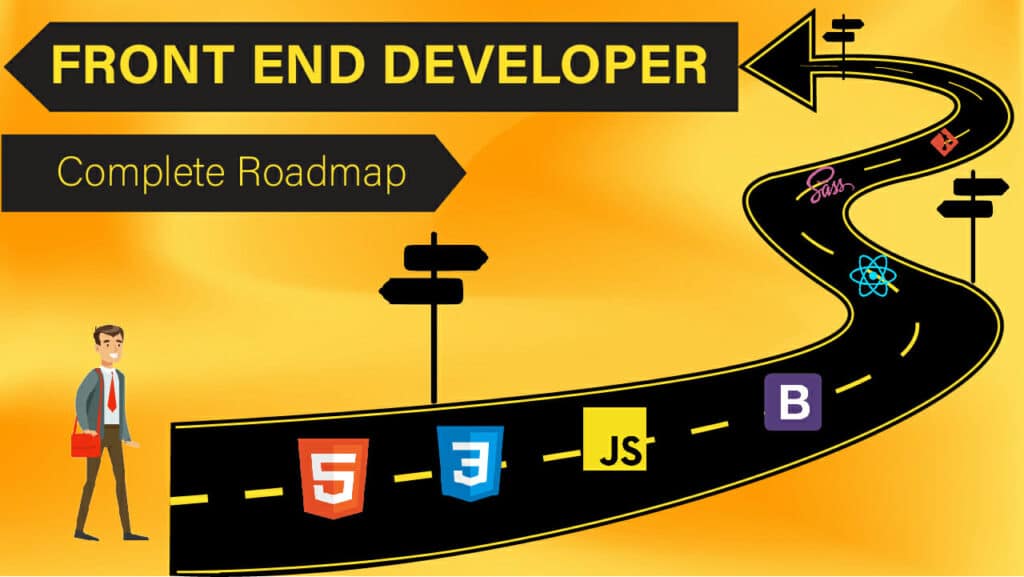
The role of a front-end web developer has never been more vital than it stands today. As organizations and individuals pursue a digital first approach in their lives, skills in front-end development are increasingly preferred and sought after more than ever before. Be it a grocery e-commerce platform or an occasional personal blog, all of them need an expert to develop user-facing components into most websites and applications. A career in this profession is certainly your best choice.
From this blog post, you will learn everything about front-end development, what skills it requires, what the job market looks like, and how to get into and prosper in this ever-evolving career path—you’ll find out here, whether you’re a newbie in coding or an experienced developer looking to break into frontend coding.
Intro to Front-End Web Developer?

Essentially, a front-end web developer perfects the looks and feel of a particular website or perhaps an application, which are the only parts visible to a direct user. Front-end developers use programming languages, which include HTML, CSS, and JavaScript, for easy interactivity and visual work for an attractive user interface. In doing all these, they make sure that the site is most functional—in a user-friendly, intuitive manner, and aesthetically appealing.
Simply put, front-end web developers are the professionals who take care of everything from the final designs to clickable, usable, and used according to brand and client expectations. The interface is between the design team and the back-end developer, making sure that the customer touchpoint—be it a smartphone, an iPad, or a desktop computer—functions efficiently with regard to the product.
Key Responsibilities of Front-End Developers
The above responsibilities will vary from one company or project to the next:Typical front-end developer tasks include developing the following:.
- Translating Designs into Code
The UX/UI designers give front-end developers mockups and wireframes, which can create the web pages using HTML and CSS and make them work beautifully across a wide range of devices. - Ensuring Cross-Browser Compatibility
Not all web browsers (Chrome, Firefox, Safari, etc.) present a website the same way as their counterparts. It is the job of the front-end developer to conduct the testing and adaptation for the websites to work more smoothly across all main browser platforms. - Making Websites Responsive
Organizations today have a fantastic chance to reach their audiences via their websites. Responsive adults are expected to set up their computers in parallel so that their sites will adapt to different screen sizes and formats. Responsive design allows users to enjoy a smooth navigation experience on any device, and responsive methods on the front end will be used to implement this. - Optimizing Performance
Web users expect fast loading of websites because they feel bored quickly if the site takes too long to load. It will also make them leave the website with high bounce rates. The developers usually accomplish code optimization and image optimization for the sake of reducing loading times and improving performance. - Implementing Interactivity
JavaScript forms the building block of every interactive click within a website. Whether it be a dropdown menu, form validation, or any dynamic feature, all these are implemented by front-end developers using JavaScript and its frameworks. - Maintaining and Updating WebsitesThe work does not end when the website goes live. It passes over to front-end developers in terms of website maintenance, site updates, bug fixing, enhancements of functionalities, and also an enhanced user experience.
Essential Skills for Front-End Web Development

To succeed in front-end development requires having technical proficiency and creative problem-solving skills. The following is a list of the most critical skills you will need to achieve that:
Technical Skills
- HTML/CSS
HTML and CSS are the foundations of any front-end development. HTML provides basic structural elements to website pages, while CSS is used to define page style. To design great web pages, front-end developers should be very familiar with both HTML and CSS and how they make pages accessible, semantic, and properly structured. - JavaScript and Its Frameworks
JavaScript is what makes a website interactive. It is a must-do in functions such as validating forms, animating things, events, and manipulation of DOM (Document Object Model). By understanding the frameworks of JavaScript such as React, Angular, and Vue.js, you can work faster and have more marketability. - Version Control (Git) is a version control that allows developers to track modifications to the code. Though using tools such as GitHub or GitLab will help developers work with each other, manage code, and track project history.
- Responsive Design
Since during the past years people were using the internet more often on mobile devices, a front-end developer must have responsive design as a skill. Mobile devices are able to make use of frameworks such as Bootstrap and CSS Grid, enabling developers to set layouts that automatically adapt to their size. - Cross-Browser Compatibility
Browsers do not render HTML and CSS identically. Hence, front-end developers often use CSS hacks or JavaScript splits to make their sites perform consistently across Chrome, Safari, Firefox, and others. - Performance Optimization It is actually speed that holds the client on the website. For front-end developers, it is a must to know ways of optimizing assets, minimizing HTTP requests, and using cache to speed up and even improve the performance of a website.
- Testing and Debugging
For front-end developers, they must know how to debug and test codes. There are some tools, such as Chrome Developer Tools, Jasmine, Mocha, and Jest, that offer testing for the code so that it is free from bugs and works in various scenarios.
Soft Skills
- Problem-Solving
But beyond that, front-end developers can also be in trouble as a result of any complex design issue, browser incompatibility, or glitch due to performance. The art of analyzing problems and finding solutions in the least possible time is essential. - Collaboration and Communication
Though front-end developers normally work with other back-end developers, UX/UI designers, product managers, and any other stakeholders in their work environment, the most interesting part of their job is clear communication, ensuring that your final product meets expectations. - Attention to Detail
Most likely, any slight inconsistency in design or in coding may change the whole application usability experience. Absolutely important to front-end developers is laying out pixel-perfect designs, which are smooth and seamless in interaction. - Creativity
Front-end development entails coding proficiency, but it is also a field of creative art. Front-end developers should also have an eye for designs, colors, fonts, and usability to make sure that their work is just as good on screen as it makes sense to users.
The Current Job Market for Front-End Developers
It is a booming job market for front-end developers, and the market is expanding year-on-year. This is mainly because of the digital transformation underway in a lot of businesses, as they are realizing the importance of keeping a strong online presence.
Job Outlook
According to projections made by the U.S. Bureau of Labor Statistics, web development jobs (including front-end) will grow between the years 2020 and 2030 by 13%, far outpacing the average of the rest of the occupations. Businesses hire across much of the spectrum, from tech startups and outside established companies to everything in between. To this effect, the increase in e-commerce, mobile applications, and the provision of digital services have strengthened this demand.
Salary Expectations
Front End Development offers lucrative salaries that increase based on the experience and skill specialization of the individual. Here is a generalized salary breakdown:
- Entry-Level: 50,000-$70,000 annually
- Mid-Level: 70,000 to 100,000 annually
- Senior-Level: $100,000-130,000 per year
- Freelancers and Contractors: Rate varies between $30 and $100 per hour depending on skills and the project complexity.
Based on factors such as geography-locational earnings as compared to those of developers in tech hubs, such as Silicon Valley, who may tend to earn higher, and whether or not specializations in specific technologies matter.
How to Get Started in Front-End Development

If you are gung ho to begin a career as a front-end developer, these are the steps that one must take to gain success in one’s journey:
- Learn the BasicsMaster HTML, CSS, and JavaScript and visit platforms where you can get courses like freeCodeCamp, Codecademy, and Udemy at all levels.
- Build a PortfolioYour portfolio is really your passport. With your own personal projects, you can show just how well you convert designs into working web pages. Include the code on GitHub so that potential employers can see how you write code.
- Understand the Latest Tools and FrameworksNew front-end technologies update rapidly. Get comfortable with frameworks such as React, Vue.js, or Angular. Learn about CSS preprocessors like Sass and build tools like Webpack or Gulp.
- Apply for Jobs and InternshipsSeek opportunities that can be called entry-level but can also serve as grants to gain experience and learn in the field. Don’t think that getting your dream job is not possible. Keep building on your skillset and networking.
- Keep ImprovingChanges regarding web development keep fluctuating. Keeping abreast of the changes via industry bloggers, conferences, and master classes may also be of great worth.
Challenges in Front-End Development and How to Overcome Them
A few challenges involved in pursuing a career in front-end web development: As interesting and varied a field as it is, it has its own drawbacks, with a few of those being:
- Rapid Technological Changes
Rapidly changing trends in front-end technology. You literally have to keep updating yourself with the latest frameworks, tools, and techniques in order to remain relevant. - Imposter Syndrome
Many developers suffer from imposter syndrome, feeling like they are not “good enough” in how they don’t have adequate skills. You can follow your progress and remind yourself that improvement is a journey that never stops. - Dealing with Complexity
With increasing complexity comes an increased chance of difficulty in debugging and maintaining code. Modular programming techniques help; writing clean and readable code is another important factor. If all else fails, take the help of communities, like Stack Overflow.
Conclusion: Take the Leap Into Front-End Development
Amazing career opportunities await anyone interested in coding, mashing, or manifesting good user experience in observability; front-end web development is one such opening. For everyone with the correct discipline and will skill, there is also great reward on this path.
So, if you are ready for the first step on your front-end development journey, Digi Dervish is here to guide you. There are many resources, job lists, and professional advice available to help get you into the field and advance your career. Visit Digi Dervish today to get on the path to becoming a top-notch front-end developer.



